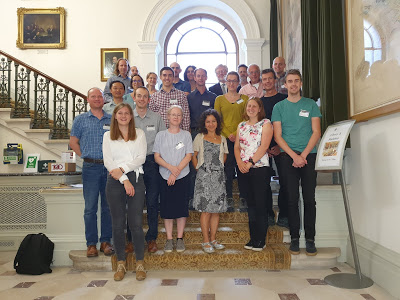Fromm 2 – 4th Sept 2019, a friendly group of 29 scientists interested in debris-covered glaciers and lake hazards gathered at the Geological Society in London (https://www.geolsoc.org.uk/GSL-Debris-Covered-Glaciers) to discuss the current state of research and to agree upon future research priorities, and in particular to address concerns related to the effects of climate change on glaciers and lakes in high mountains. This meeting was initiated by the UNESCO-IGCP 672 project “Himalayan Glaciers and risks to local communities” leader Adina Racoviteanu from Aberystwyth University, UK and was attended by Asian co-leader Smriti Basnett from IIsc India. The meeting focused on developing methods for systematic monitoring of Glacier Lake Outburst Flood (GLOF) potential in the Himalaya using remote sensing, and disseminating the methodologies developed via training workshops for local institutions in India, Bhutan and Nepal. The objectives of the meeting were closely aligned with the International Association of Cryospheric Sciences (IACS) and International Permafrost Association (IPA) working and standing groups on Debris Covered Glaciers and Glacier and Permafrost Hazards in Mountain Regions, both of which are open to membership and new contributions to anyone.

During the first afternoon, seven experts gave talks on the state of research on debris covered glaciers and lakes (abstracts of the talks are available here):
- Dr Tobias Bolch – Mapping, area change and mass balance of debris-covered glaciers from space
- Dr Evan Miles – Ice cliffs and supraglacial ponds: state of knowledge and research directions
- Professor John Reynolds – An introduction to Glacial Lake Hazard Assessments
- Dr Duncan Quincey – GAPHAZ – a Scientific Standing Group on high-mountain glacier and permafrost hazards
- Dr Matt Westoby – GLOF modelling: state-of-the-art, opportunities, and complications
- Dr Jonathan Carrivick – Impacts of glacier outburst floods within high mountain regions
- Dr Scott Watson – Communicating earth observation data on Himalayan debris-covered glaciers and high mountain hazards
During the following two days, participants split into break-out sessions and addressed three main topics: 1) debris-covered glaciers; 2) glacial lake ranking schemes using remote sensing to assess hazard potential and 3) climate change and debris-covered glaciers. Additional smaller working groups focused on science communication and capacity building needs, drafted collaborative papers and developed a call for a PhD studentship.
Thanks to all the participants for a productive workshop!
Acknowledgements: Thanks to the Geological Society for hosting and supporting this meeting, and to all contributors for making such a successful workshop – what a great community!
FUNDING: We acknowledge the funding sources which made this workshop possible. We wish to thank the Geological Society for providing support and logistics in London. The IGCP 672 project, funded through UNESCO and IUGS has funded the participation of Mrs S. Basnett, Asian co-leader. The DISCOVER GLACIERS project funded through the from the European Union’s Horizon 2020 research and innovation programme under the Marie Skłodowska-Curie grant agreement No 663830 supported the participation of project leader and workshop facilitator A. E. Racoviteanu using the Ser Cymru funds.
